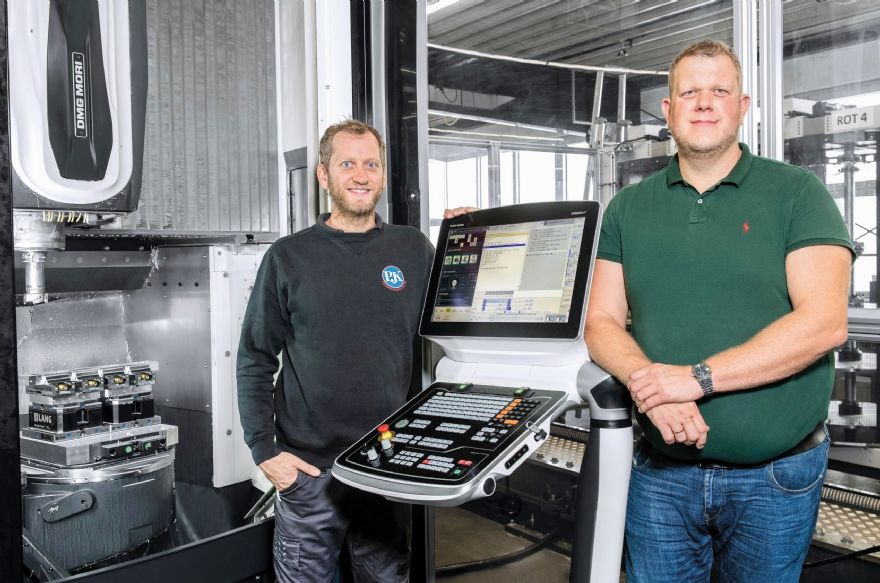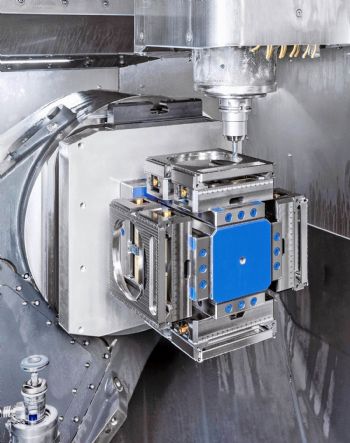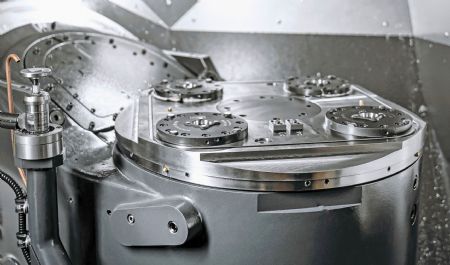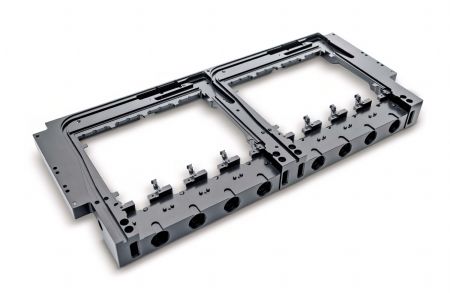 Julian Klein (left) with brother Peter, joint managing directors of Peter Josef Klein Feinmechanik GmbH
Julian Klein (left) with brother Peter, joint managing directors of Peter Josef Klein Feinmechanik GmbHSince 1983,
Peter Josef Klein Feinmechanik GmbH (PJK), a 50-employee family-owned sub-contractor based in the German town of Sankt Augustin, near Bonn, has been producing precision components and assemblies from aluminium, titanium, stainless steel and high-performance plastics for customers in a wide variety of industry sectors, including aerospace, medical, and food.
For metalcutting, the company mainly uses machine tools from
DMG Mori, including seven DMU 60 eVo machining centres, all of which are automated. Two of them are connected via a pallet-handling system, which has 40 locations and can accommodate 300 fixtures that can be swapped between the pallets. An Erowa MTS zero-point clamping system is used as the basis for the flexible, automated cell.
 Pictured left: Working area of one of the DMU 60 eVo machining centres installed at PJK
Pictured left: Working area of one of the DMU 60 eVo machining centres installed at PJKSecond-generation Peter Klein, who runs the company with his brother Julian, said: “We accompany our customers from initial consultation through prototyping and series production to finished product delivery. Our main challenges are the extreme quality customers require and the high degree of competitive pressure. Our components are accurate to within microns, while at the same time we also have to continuously check and optimise our processes.”
One way of meeting these challenges is autonomous manufacturing. PJK has been using automated manufacturing cells to maximise machine utilisation since 2011. It means an employee can operate several machines during day shifts, and the company gains extra production output during unmanned running overnight and at the weekend.
PJK has been using DMG Mori machining centres for many years, and to ensure precise and dynamic machining, the majority of them are fitted with linear drives. Julian Klein explained: “The machines produce our range of components efficiently by five-axis machining and also meet our tight tolerance requirements.
Five-axis machiningCustomers stipulate accuracies down to single-figure microns and we have to hold them consistently. Five-axis machining contributes to our ability to control this level of quality, as the number of manual reclampings is reduced or even eliminated.”

On the two DMU 60 eVo machines integrated into the large pallet-handling system, DMG Mori developed and fitted a table with an embedded MTS zero-point clamping system (pictured right). The original table with a mounted fixture took up a lot of space, whereas the current solution is lower profile and of smaller circumference, maximising the working volume and reducing the risk of interference between component and cutters. Additionally, machining is more stable, leading to better accuracy and surface finish.
Peter Klein sees a major advantage in the flexibility of the pallet handling system. He added: “The MTS clamping system makes it possible to use traditional machine pallets, including with towers for series production. It leads to a very wide range of components that the two DMU 60 eVos can machine completely autonomously.”
 Pictured left: PJK manufactures complex aluminium, steel and plastic parts for customers in the medical, food and aerospace industries
Pictured left: PJK manufactures complex aluminium, steel and plastic parts for customers in the medical, food and aerospace industriesPeter Klein continued: “However, it does mean that the manufacturing cells need to be very reliable to avoid interrupting production. The seven machining centres are in continuous use for up to 22 hours each day and any downtime would have a detrimental impact on productivity, which is why DMG Mori’s all-encompassing service provision is very important.”
Extensive use is made of digital technology at the Sankt Augustin factory. It starts with flexible order planning in a CRM system, extends through CAD/CAM, programming and manufacturing, and on to computer-aided quality control. If a tool breaks during a cycle, the machine stops automatically and the cutter is exchanged for a sister tool to allow production to continue almost seamlessly.
The Klein brothers are committed to digitalisation, regarding it as a decisive competitive advantage. Consequently, all future investments will be influenced by the equipment’s ability to be incorporated into an end-to-end digital workflow.